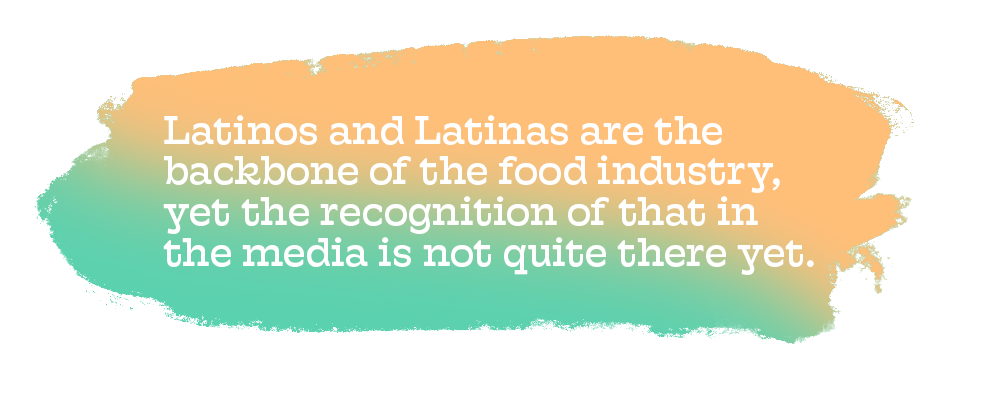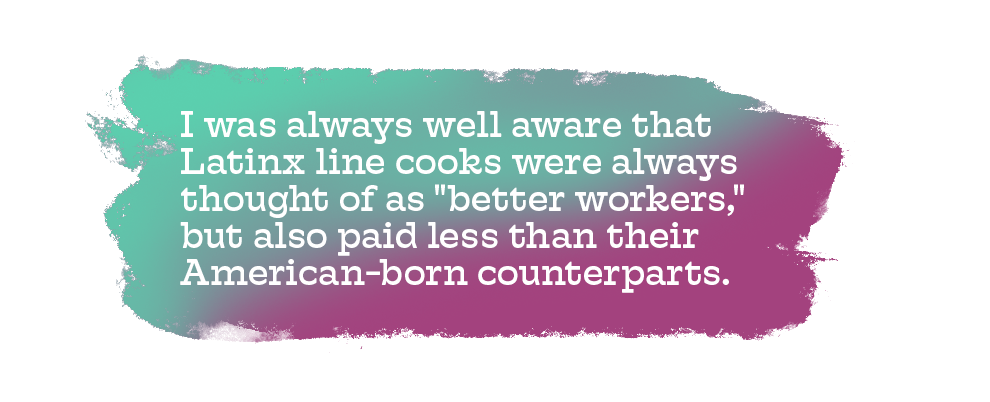To celebrate National Hispanic Heritage Month, BuzzFeed chatted with ten leaders in the food world to discuss Latinx representation in the industry.

It's no secret that the American food industry is dependent on Latinx workers. Anthony Bourdain once said, "as any chef will tell you, our entire service economy — the restaurant business as we know it — in most American cities, would collapse overnight without Mexican workers."
It's estimated that Hispanic and Latinx workers make up 25.4% of the total workforce population of "restaurants and other food services" occupations. But despite their massive influence on the food world, since 1991 only 2.4% of the individuals nominated for the James Beard best/outstanding chef categories have been Hispanic.
So we talked to Latinx chefs, bloggers, and food writers to get a varied perspective of what it’s like to work in an industry they dominate, but are often underrepresented in. Here's what they had to say about life, work, and all things food:
Marcela Valladolid: Chef, TV personality, and cookbook author.

Who inspired you to start cooking?
I've always said it was my aunt Marcela (same name — also a chef). She inspired me to pursue cooking professionally, but the truth is, I had a friend at the time, Claudia Rosas, who inspired me to look into cooking. We grew up together and I always loved her home, family life, and how food was always at the center of everything. I grew up with that on my mom's side of the family, but not so much with my immediate family. She was a huge inspiration to me. I don't think I've ever told her.
From your perspective, how have immigrant workers shaped the food industry?
They're the f*cking soul of it. The backbone. The everything. Every time I go to an awards ceremony, I don't understand why there isn't more mention of the men and women who work insane hours on virtually no pay while we get accolades and press. I'm certainly one of them. Our food, our culture, our traditions — they've made it possible for non-immigrants to make a killing. I respect the smart business minds that can accomplish this, but I certainly feel recognition is lacking.
Do you think there is anything missing in media coverage of Latinx chefs?
Absolutely. How many Latina chefs do you see hosting shows now? Speaking about their culinary perspective? As a part of a panel? Get the numbers. Considering we're the fastest growing demographic I think it's bad business to not give us more of a platform. I sincerely think that folks don't want to change what they think is a successful formula. I like risk takers. They're the ones that end up changing the world.

Alejandra Ramos: Food blogger and TV personality.

Who do you look up to in the food industry?
I love how Marcella Valladolid has been using her platform lately to speak out about the injustices of this administration against Latinos and immigrants. She’s gotten a lot of vitriol from fans who want her to “stick to food,” and I admire her for ignoring them and continuing to speak truth to power.
Off camera, I also love everything that Julia Turshen is doing to promote diversity within the industry and give lesser-known talents a voice and seat at the table.
Have there been any unique obstacles you have faced as a female, Puerto Rican chef?
All women that work on camera have to deal with inappropriate messages and harassment from male viewers, but there’s a certain level of fetishism and stereotypes about Latina women that adds a heightened level of grossness to it. The stereotypes also come into a lot of casting decisions. People have a very specific idea of what a Latina woman should be, and that’s what they want to see and hire. I’ve had producers ask me if I’m “fiery,” directors who’ve asked me to read a line again “with a bit more Latin flavor,” and casting agents who have expressed disappointment that I don’t have an accent or focus exclusively on Latin food. I’m 100% Puerto Rican so everything that I do or say is by default something a Latina woman does, but that’s often not enough for television.
There are also seemingly inconsequential things that cause me a lot of stress every time I have a TV shoot. Will the host pronounce my name correctly or make some kind of joke about it on the air? (It’s happened!) Is the hairstylist going to know how to style my natural, curly hair or have edge gel for my baby hairs? It seems so basic and superficial, but these are very real issues for people of color working in a space primarily designed for white people.
Is there anything missing in media coverage of Latinx chefs?
I want to see more stories told, written, reported, produced, and edited by Latinos. There’s a lot of nuance missing in the way the media talks about our food, and that’s a direct reflection of the cultural makeup of a lot of newsrooms, mastheads, and production offices. We need Latinos in positions of power who are able to assign and produce stories, not just because they fit into some kind of trend or theme, but because they know that it’s good or important or even just really fun and interesting and should be told!
I’d also point out that even when people have the best intentions, it’s very easy to get the details wrong when you’re coming in with a language barrier and an outsider's perspective, and that’s frustrating to see when you know there are plenty of incredibly talented people ready and able to do it right. I’m not saying that only Latinos can tell Latino stories, but there needs to be people involved at various steps of the process who know enough to be able to catch things and say, “er no, that’s not right.”

Eileen Andrade: Chef and owner of Finka Table & Tap and Amelia's 1931.

Who do you look up to in the food industry?
I really look up to Michelle Bernstein who brought the food scene in Miami to another level and also showed Miami that a lady can kick ass in the kitchen, too!
How have immigrant workers shaped the food industry?
Immigrant workers are the heart and soul of the food industry. Without them, we wouldn't have people to grow, pick, and nurture our crops. Also, most of the best line cooks I have come across are immigrants who work really hard to make sure their work comes out perfect.
Do you think there is anything missing in media coverage of Latinx chefs?
I think people just identify Hispanic chefs in one category. I think we are categorized as just "Hispanic," but there is so much more depth to it. We have Cuban, Venezuelan, Colombian, Argentinian, and Peruvian chefs really elevating their cuisine in their own way.

Aarón Sanchez: Chef, TV personality, and cookbook author.

What's a dish that tastes like home?
Squash blossom quesadillas. They're one of the first things I remember making with my abuela as a kid.
Do you feel like there have been any unique obstacles you've had to face as a Mexican-American chef?
I think all minorities just have to work that much harder to be successful. We have to have a great work ethic and a super clear vision to make it. In terms of the food I cooked early on, I had a mission of educating people that Mexican food is not just nachos and burritos, and that there are so many different techniques, dishes, and ingredients that are from particular regions and states in Mexico.
Is there anything missing in media coverage of Latinx chefs?
I think it’s changing, which I am incredibly happy to see. Latinos and Latinas are the backbone of the food industry, yet the recognition of that in the media is not quite there yet. I’m honored to have my scholarship foundation in which we are empowering young aspiring Hispanic chefs by sending them to culinary school and giving them the mentoring, resources, and education to create the next generation of culinary leaders.

Rick Martinez: Food writer and recipe developer.

Favorite thing to cook?
I love cooking with fresh corn masa. Making tortillas, tamales, sopes, and huaraches by hand helps me feel connected to my family and my culture.
How would you respond to food writers and critics who say, “Mexican food shouldn’t be expensive”?
Great food comes in all forms and at many price points. There are amazing taco stands with delicious tacos made with passion and love that cost very little. And there are great chefs that are innovating Mexican cuisine and introducing us to dishes using traditional methods, familiar flavors, and indigenous ingredients.
These chefs understand their food, culture, and their history. They're the students of culinary heritage and create experiences with a personal and contemporary twist. And that is what you are paying for. Expertise, thoughtfulness, and creativity.
Have there been any unique obstacles you've faced as a Mexican-American working in food media?
Years ago, I was told that I was “cheating” when I developed Mexican food recipes because I am a Mexican-American and because I was probably just "repurposing" my mother’s recipes. The truth is that I did learn to cook from my mother, and I am inspired by her food, but her food is very specific to central Texas where she grew up. I have traveled to Mexico for the last 20 years and studied its regional and indigenous cuisines. But when confronted with that attitude, I felt I had to pull back and prove that I was capable of cooking food of all cultures.
Today, I unapologetically cook the food that I want to eat. Some days it's Mexican and some days it’s not. My advice to young Hispanic cooks or cooks of any country or culture is to be true to yourself. Prove to yourself that you're a good cook and capable of cooking anything. And cook the food that you love.

Adrianna Adarme: Founder of A Cozy Kitchen and cookbook author.

Who inspired you to start cooking?
My family owns one of the oldest bakeries in Peru (Dulcería Santa Rosa), so I suppose you could say it’s in my blood. But specifically, my tía Emilia, who founded the bakery, inspired me. She used to visit us in the States and would always bake, like, straight off the plane. It’s how she said "thank you" — how she showed love. She’d make everything from mazamorra morada, to alfajores, to all sorts of cakes. My brother and I would help her in the kitchen and those are my favorite baking memories as a child. They were special.
Do you feel like there are any unique obstacles you've faced as a Latin-American food blogger?
If anything, the internet has leveled the playing field a bit. On the internet, there aren’t executives in a room deciding what entertainment the country will enjoy — instead, people follow who they want to follow. When I go into my DM’s on Instagram, I’m always like, “WOW, my audience is so diverse, so interesting, and so cool." I feel like they could all be my friends in real life.
Do you think there is anything missing in media coverage of Latinx chefs?
I want to see more stories about us, being told and structured by us. I would love to see a POC-owned food magazine or major media outlet. Owning our own narrative, profiting off of our own stories, culture, and food is something I’d love to see more of.

Gerardo Gonzalez: Chef and owner of Lalito.

Favorite dish to cook?
The birria that my grandmother taught me to make. It's the best memory I have of food growing up, associating it with large parties we would have for all the aunts and uncles that got married in my family (which is rather large and based in San Diego, California). My parents are both from the state of Jalisco, Mexico and immigrated to California at very young ages. In many ways, these functions — whether huge gatherings or backyard carne asadas — were the most direct way to connect to heritage and the foods and flavors of my grandparents and family at large. The taste of these foods I grew up with hold more than just a sensory function, as deciding to cook professionally was a way to recreate the feeling of feeding large groups of people in a celebratory space.
Have there been any unique obstacles you've faced as a Latinx chef?
Having worked both front and back of house within restaurants, I used to joke about the way gender and race would subconsciously determine peoples entry roles into the industry. Like being a Latin male, I always felt like I was more likely to be hired as a busboy and work my way up to being a server, even if I had experience in that position before, instead of outright being hired in that higher position. Those roles associated with a higher pay or more authority always felt like I had to prove my talents, rather than allowing my experience alone to speak for them. Simultaneously, in the back of the house, I was well aware that Latinx line cooks were always thought of as "better workers," but also paid less than their American-born counterparts. Like the economics matrix of how to run a restaurant successfully meant you needed this workforce to get shit done while keeping the overall labor cost down. At worst, this is downright exploitation, and, at best, this demonstrates how deeply flawed the systems of dining out just are.
Is there anything missing in media coverage of Latinx chefs?
I'm starting to see more visibility of all types of cuisines in media coverage and representation of chefs from all over Latin American countries from the chefs that actually have ancestral ties to the culture, which is great. I hope that continues beyond heritage months and exploration into the ideas of what makes up Latin American food, in general. I believe that the whole history of the world can be traced in the foods of the Americas and Caribbean — be it through indigenous traditions, Asian trade routes, the strong cultural ties through Africa and the Middle East, and, lastly, from European colonialism. As much as I try to use food as a tool to discover ways that food, ingredients, and methods have roots all over the world, I try to further understand what it means to be of Latinx decent by acknowledging the wide range and variance with all countries and how it also unifies us in our similarities.

Mercedes Golip: Food stylist, artist, and recipe developer.

Favorite thing to cook?
I’m originally from Venezuela and find a lot of comfort in cooking the food I grew up eating — just by flavor memory without following recipes. I take up the challenge of using whatever ingredient is available on a given day, and see how a familiar recipe can turn into something else with the addition of local ingredients. That is also a very personal metaphor for my life.
What's a dish that tastes like home?
Any dish with sweet and savory components wins my heart. It happens all the time and it doesn’t matter where that dish is from, it immediately takes me home.
Do you think there is anything missing in media coverage of Latinx chefs?
We could all agree that there is a food revolution going on. So many interesting things are happening; many chefs and personalities are joining forces to break stereotypes and elevate our culture through food. People are getting more exposure to a broader representation of our gastronomy and the interest keeps growing. There is some media recognition about that, but still not enough. Sadly, the mainstream narrative keeps revolving around a negative portrait of Hispanics that continues to fire up the fear of the unknown. Change always comes, our generation is paving the path for the younger ones and the hard work of many is paying off.

Claudette Zepeda-Wilkins: Chef and owner of El Jardín.

How would you respond to food writers and critics who say, “Mexican food shouldn’t be expensive”?
I would challenge them to make tamales de masa colada in banana leaves or dig a pit for cochinita pibil.
Anything missing in media coverage of Latinx chefs?
I think the few Hispanic chefs featured in food media are the same when talking about Mexican food. There is a lot of untapped talent that should be given the opportunity to shine on their own. I personally have been shot down for story pitches because I didn't have a high-profile chef above me.
From your perspective, how have immigrant workers shaped the food industry?
Anyone who says immigrant workers haven't shaped the industry hasn't been in a kitchen before. When you walk into any kitchen and see that it's being run by immigrants, it's a kitchen that steadily hums without skipping a beat. They do the jobs entitled employees won't do, and they'll do it exactly how instructed, not how they thought it "would work better." If we were to remove immigrant workers from kitchens, the majority of restaurants would have to close their doors. I firmly believe this.

Brenda Blanco: Culinary video producer at Tasty.

Who inspired you to start cooking?
Juan Manuel Barrientos has inspired me to make food and food content with purpose and intention. In his case, he cooks to share his roots and his talent, which he then translates into a movement against violence in Colombia. How amazing is that? In my case, I share each food video with the intention of sharing a culture and a story, and then turning it into a link that connects and celebrates Latinos.
Do you think there is anything missing in media coverage of Latinx chefs?
We need to see more of us out there! Latin Americans not only make up a large portion of the food industry, but we have incredibly talented individuals who keep innovating and influencing the field. It's about time we are given the chance to come out from behind the scenes and step in front of the camera — on magazine covers and written about in articles. And let's not forget the incredible power our market possesses.
How have immigrant workers shaped the food industry?
It's rare not to see a Latin American in our farming fields, in the kitchens of our favorite restaurants, prepping food for "big" personalities on food shows. We are a pivotal element of the food industry in this country and around the world. Whether we are cooking your favorite European dish, or harvesting the food later found in your supermarkets, we have worked to bring food to your table.

Are you a writer, producer, or casting director looking to highlight a more diverse pool of culinary talent? Check out Equity At The Table, a database of food professionals ranging from chefs to food stylists.
Responses have been lightly edited for length or clarity.
Check out even more awesome Hispanic Heritage Month content!


